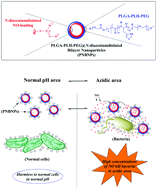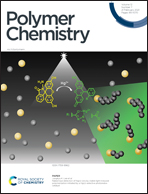Surface charge switchable nanoparticles capable of controlled nitric oxide release for the treatment of acidity-associated bacterial infections†
Abstract
Among the strategies for the treatment of bacterial infections, antibiotics are one of the preferred options. With prolonged use, however, antibiotic resistance has become a growing problem, especially the significant antibacterial activity loss against acidity associated bacterial infections. Herein, surface charge switchable nitric oxide (NO)-releasing nanoparticles (PNBNPs) were designed and synthesized. With the protection of the surface charge switchable shell, the PNBNPs maintain weak negative surface charge and “silent” status during transmission under normal physiological pH conditions. In an acidic environment, the surface polymeric shell is protonated, giving it a positively charged surface, and this benefits the binding of the PNBNPs with the negatively charged bacterial surface. In contrast to the significant antibacterial activity loss of antibiotics in acidic environments, the PNBNPs trigger faster NO release to form highly reactive oxynitride species (such as N2O3, NO2−, OONO−, etc.), causing strong membrane disruption and cell apoptosis, leading to intensive antibacterial activity. The PNBNPs demonstrated excellent biocompatibility and acidity-associated bacterial infection targeted treatment, according to the bacteria binding, the antibacterial activity, and normal cell cytotoxicity assays in vitro, as well as investigations into the therapeutic effects in different pH environments in vivo. These responsive NO-releasing nanoparticles will provide a new option for overcoming acidity-associated bacterial infections and antibiotic resistance problems in the future.



 Please wait while we load your content...
Please wait while we load your content...